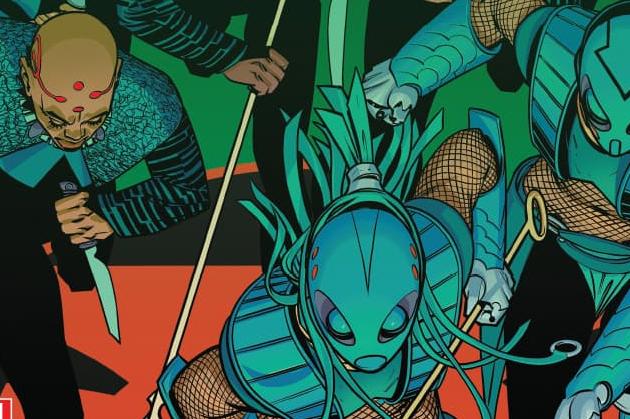Black Panther #6
Writer: Ta-Nehisi Coates
Penciler: Chris Sprouse
Inker: Karl Story
Color Artist: Laura Martin
Letterer: Joe Sabino
Publisher: Marvel
I can't get over how much of an anomaly this volume of Black Panther is. Scripted by one of the most prominent writers in America, the book is one of the biggest hits in recent memory but as much as I like it, it always feels a bit unaccesible. Coates is writing a book heavily referential of philosophy and that is very far removed from what I (we?) have come to expect from superhero books, and it somehow has become the most read Black Panther book ever.
Past issues focused on Wakanda over the series' protagonist but with Black Panther #6, Coates's version of T'Challa really comes into its own. By design, Priest's run otherized the Black Panther through the use of Everett Ross as an audience surrogate. And while Hudlin did not have that same fixed perspective on a single character, with a lot of issues being narrated by T'Challa himself, most of his early run was told through the point of view of someone watching the Black Panther, be it Luke Cage, Klaw, or some other character. On the other hand, Coates allows us a more intimate look at T'Challa's thoughts through his inner monologue. There's even a brief moment of vulnerability (very rare for the character) in the “I am a scientist” passage.
At the same time, Coates' Black Panther feels colder. The magnified masculinity that was present in Priest and Hudlin's runs is not here. T'Challa, a master strategist as we are constantly reminded, allows himself to be captured in order to defeat Zeke Stane. That's something that I think neither Priest nor Hudlin would've written. That's not to say Black Panther isn't as headstrong as he's always been, and while he recognizes the subtleties in Changamire's revolutionary discourse that his council chooses to ignore, he's not willing to relinquish power.
Regardless of the writer, this character is almost always fascinating. If you're willing to over-simplify their characters T'Challa is not too different from Captain America in how unyielding they are written to be. And seeing that personality contrasted against the world that Coates has written, where everyone, including the Black Panther, is standing on morally ambiguous ground, is one of the most appealing aspects of this series.
Chris Sprouse took over from Brian Stelfreeze (who drew an amazing cover for this issue) for the past two issues and his lines have been more than competent. Sprouse's excellent layouts for the sequences following Shuri and Ramonda on The Djalia are a perfect fit with the oral story that Ramonda is relating. Sprouse places one panel with both of those characters on each page, framing a larger, boundless panel with different pictures from Ramonda's tale stacked on top of each other. Sprouse's BP does look about ten years older than Stelfreeze's but that has more to do with how radically different the latter's inking is from Karl Story (or most inkers for that matter).
Even though the pencillers changed, having Laura Martin on colors gives the series a cohesive look. It's an strategy that Marvel has used for other comics that have used fill-in artists, like Silk and The Ultimates, and the palette consistency improves the reading experience significantly. It helps that Martin's colors look great on the Hatut Zeraze and the Dora Milaje, not to mention the stunning scenes that take place on The Djalia.
I haven't written about the role that public perception and leaked information has played in this series and I think that's very interesting. I think the reason that this has become so immensely popular despite all its idiosyncrasies is that it strikes at a lot of themes that concern a great deal of people currently. And while Coates' story hasn't had many big fist pump moments (last page of this issue being one of a handful), all parts of Black Panther are very accomplished, from Coates' layered prose and dialogue to Stelfreeze and Sprouse's versatile art.





